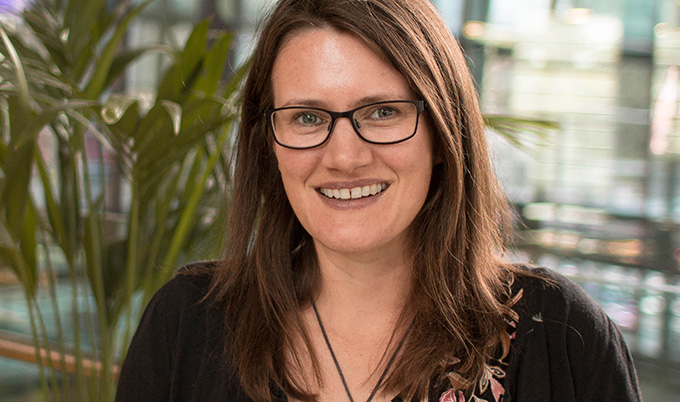Royal Society Faraday Discovery Fellowship
Climate expert awarded Royal Society Faraday Discovery Fellowship
Published on: 28 August 2025
Professor Hayley Fowler has been awarded a Royal Society Faraday Discovery Fellowship to tackle extreme weather risks.
She is one of seven pioneering researchers have been announced as the first recipients of the Royal Society Faraday Discovery Fellowships, prestigious long-term awards to support exceptional mid-career research leaders in the UK.
Selected from more than 600 initial applications, the first cohort will investigate fundamental questions, from predicting extreme weather in the face of future climate change to the role of RNA structure in regulating gene expression in plants.
This flagship grant, supported by a fund from the Department of Science, Innovation and Technology, provides up to £8m over a 10-year period to allow talented mid-career researchers to pursue high-quality original research and develop world-leading research groups in the UK.
The grants also aim to develop a pipeline of future research talent, through mentoring and training opportunities for grant holders and their research groups.
Fellows this year will hold their awards at six institutions: the University of Sheffield, John Innes Centre, Newcastle University, University of Oxford, Imperial College London, and University College London.

Exploring questions at the frontiers of human knowledge
Sir Adrian Smith, President of the Royal Society, said: “This exciting first cohort of Royal Society Faraday Discovery Fellowship fellows are using cutting-edge techniques to explore questions at the frontiers of human knowledge.
“From the ways in which human, or artificial, intelligence builds understanding of the world, to investigating the atomic-to-atmospheric-scale systems that could unlock new materials, strengthen food security and support our resilience to climate change.
“These 10-year fellowships give researchers space to pursue new knowledge, build their research groups and develop close collaborations around the world that will ensure the UK continues to develop and attract the next generation of scientific talent and bring benefits to the whole country.”
Lord Vallance, UK Science Minister, said: "Turbo-charging our world-class institutions with the very best research talent will be critical to unlocking breakthroughs that could help protect our food chains, put AI to work in the economy, and tackle climate change. That's why DSIT has backed the Royal Society with £250 million in long-term funding to support the work of mid-career researchers who are at the top of their game.
"These seven talented researchers will only bolster the rich diversity and quality of scientific enquiry, that's happening in the UK. Whether it's through backing for our homegrown researchers and innovators through our record £22.6 billion commitment to R&D, or through the over £115 million funding we're using to bring the world's best research talent here too, we're determined to see brilliant ideas brought to life, here."
EXTREME-FUTURES
Professor Fowler’s EXTREME-FUTURES project will develop a new seamless framework to improve forecasts of hydroclimatic extremes, such as flash floods and prolonged storms. Communities worldwide are facing increasingly severe floods, storms, and heatwaves as climate change drives unprecedented weather extremes. These events are difficult to predict because they result from complex interactions between global climate drivers, such as El Niño, and local atmospheric conditions. Likewise, current climate models often underestimate the changes to the intensity and persistence of these extremes with global warming, leaving societies underprepared.
EXTREME-FUTURES will combine advanced climate science with artificial intelligence, to map how large-scale climate drivers link to local extreme events, identify weaknesses in existing models, and build plausible worst-case scenarios to help communities adapt.
This innovative approach will deliver more reliable early warning systems, better tools for monitoring changing risks, and improved strategies for resilience. Ultimately, EXTREME-FUTURES aims to close the gap between science and society in preparing for a future of intensifying weather extremes.
Professor Fowler said: “I am honoured and absolutely delighted to be awarded a Royal Society Faraday Discovery Fellowship. This fellowship will provide my team with core long-term funding to make rapid and sustained advances in one of the most urgent scientific and societal challenges we face today: developing a better predictive system to mitigate the societal impacts of hydroclimatic extremes, addressing the current ‘resilience gap’. Extreme events are growing in intensity and impact every year, affecting infrastructure, economies, crops, water resources, and lives around the world. We hope to deliver a step change in how climate and weather science are integrated and applied, from individual weather forecasts to global risk modelling, to better protect potentially billions of people around the world and to help society avoid significant economic damages.
“This project would not have been possible even a few years ago, without recent advances in data science, AI and climate science. EXTREME FUTURES will produce new prediction systems to save lives in the real world and to provide information vital for climate adaptation, as extreme events continue to increase. We will work with our trusted partners in industry and government who support the project to enable the rapid throughput to policy and practice.”
Royal Society Faraday Discovery Fellowships
The Royal Society Faraday Discovery Fellowship fellows for 2026 are:
- Professor Timothy Behrens, University College London (UCL)
Algorithmic and Circuit Mechanisms for Flexible Behaviour - Professor Yiliang Ding, John Innes Centre
Deciphering the RNA language in nature - Professor Katie Field, University of Sheffield
Redefining mycorrhizal diversity for ecosystem function and sustainability - Professor Hayley Fowler, Newcastle University
EXTREME-FUTURES: A seamless framework for predicting hydroclimatic extremes - Professor Andrew Goodwin, University of Oxford
Responsive Disorder in Functional Materials - Professor Kim Jelfs, Imperial College London
Predicting synthesisable materials: bridging the gap between computation and experiment - Professor Andrea Vedaldi, University of Oxford
Spatial Artificial Intelligence
Applications for the 2026 round of Faraday Discovery Fellowships are open until 23 September.
The Royal Society has also launched the Faraday Accelerated International Route, fast-track grants of up to £4m over five years for outstanding international researchers to establish world-leading research groups in the UK.
Press release adapted with thanks from the Royal Society.



